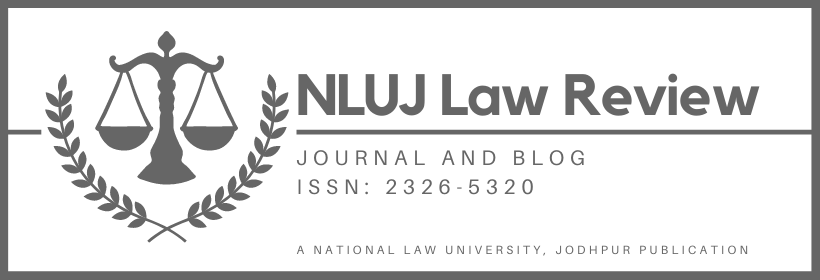Part-I of the article can be accessed here.
C. Does the Obligation to Frame Rules Consistent with those of the House of People Violate the GNCTD?
Section 4 (a) of the Amendment Act amends Section 33 of the Principal Act which falls under the rubric “Rules of Procedure”. The said amendment disallows the Assembly from framing rules of procedure conducting its business inconsistent with the rules regulating the functioning of the Lok Sabha. The challenge made to this amendment asserts that each legislative house is independent of control of the any other legislative house, and therefore the Parliament cannot usurp autonomy of the Delhi Assembly. Besides that, critics also assert that Delhi Assembly has the power to regulate its functioning traceable to Entry 39 of the State List.
The issue that arises for our consideration is whether the Parliament has, by the said amendment, breached the autonomy of the Delhi Assembly to frame the rules regulating its functioning and procedure traceable to Entry 39 of the State List. Justice Bhushan in the GNCTD II, while placing reliance on the GNCTD, observed that numerous entries delineated in the State List – including Entry 39 – shall be operational in Delhi, provided that the same is not excluded by any explicit provision in the Constitution.
Genesis of the law regulating functioning of the Delhi Assembly is traceable to Article 239AA(2)(b) of the Constitution which, in an unambiguous language, reserves “all matters” relating to functioning of the Delhi Assembly exclusively for the Parliament to legislate upon. Therefore, in light of Article 239AA(2)(b), the effect of Entry 39 in the State List is rendered infructuous for the territory of Delhi. This indicates that the Delhi Assembly is bereft of any power to regulate its functioning, which is an exclusive domain of the Parliament to legislate upon.
Surprisingly, the critics ignore that the powers, privileges and immunities enjoyed by the Delhi Assembly are already congruous to those of the House of People by force of Section 18(3) of the Principal Act. Rules of Procedure operational in the Delhi Assembly regulate the manner of discharge of powers already conferred under Section 33(1) of the Principal Act. Therefore, they neither confer nor truncate any power of the Delhi Assembly, but only regulate the manner of their discharge. Similarly, Section 4(a) of the Amendment Act does not truncate any power of the Delhi Assembly, but only regulates its discharge. Furthermore, the manner of their discharge can safely be presumed to be effective, as the same is consistent with the regulations of the Lok Sabha.
The arguments challenging constitutionality of the proposed amendment therefore lack credibility as the said amendment is an exercise of powers exclusively possessed by the Parliament as envisioned in GNCTD, and reaffirmed in GNCTD II, and in any event does not interfere with the powers of the Delhi Assembly.
D. Is the Prohibition on Assembly to Discuss the Matters of Day-to-Day Administration or Enquiring into Administrative Decisions Unlawful?
The enactment of Section 4(b) of the Amendment Act disallows the Delhi Assembly from considering any matter related to day-to-day administration and/or conducting enquiring into administrative decisions, either itself or through its committees. Aspersions have been cast against the said amendment that it prevents scrutiny of actions of the Delhi Government by the Delhi Assembly. A plea challenging the said amendment asserts that the foregoing obliterates the Delhi Assembly of its power to hold the government accountable. Succinctly put, the allegations posit that the said enactment impinges on government accountability – the cornerstone of representative form of government envisaged for Delhi under Article 239AA(2)(a) of the Constitution.
To assess the foregoing, first an attempt shall be made to analyse whether the said amendment, insofar as it prohibits the Delhi Assembly from enquiring into administrative decisions, is unlawful (1.), and then ascertain the lawfulness of prohibition on its powers to consider the matters of day-to-day administration (2.).
1. Whether the Prohibition on the Delhi Assembly to Inquire into Administrative Decisions is Unlawful?
Justice Chandrachud at para. 41 in the GNCTD stipulated that the “Government” – despite connoting the officials in administration and the Ministers – is accountable for its actions as a single entity, under the doctrine of the ministerial responsibility. The doctrine of ministerial responsibility is traceable to Article 239AA (6) of the Constitution in the context of Delhi Assembly.
The doctrine of ministerial responsibility ensures that when actions of a Ministry are called into question, it is the Minister-in-Charge of that Ministry who owes responsibility for those actions, including those of the administrative officials.[i] If the said actions are disapproved, the Minister concerned owes the responsibility towards the legislature. This is because the government departments or ministries are under the direct control of a minister, and the administrative officials therein act as per the guidance issued by the minister concerned. Legislature exercises control over the administration by the agency of a minister, who acts as a buffer between the legislature and the administration.[ii] Legislature has an indefeasible right to criticise and condemn administrative actions by criticising the minister-in-charge of the ministry concerned, but not by singling out or naming the officials under him.
Under the Rules of Procedure and Conduct of Business operational in Lok-Sabha, if an administrative official has to be accused of misconduct, the specific charges against him and the requisite evidentiary material are required to be produced before the Minister concerned. If the minister perceives those allegations as reasonable, either an inquiry is ordered by the Ministry to ascertain the validity of those charges, or a departmental action may be undertaken.[iii] To conduct an inquiry is the exclusive power conferred over the Ministry concerned, and neither the Legislature nor its Committees possess the power to inquire into actions of administrative officials.[iv] The Minister owes responsibility to the Legislature to keep it informed about status-quo of the inquiry and to assure it that the matter is being dealt with adequately.[v] The role of the Legislature, in such cases, is restricted to making comments on the nature of inquiry being conducted or the inadequacy of punishment meted to the erring officials. The Lok Sabha has noted the foregoing as a procedure that ensures government accountability for administrative actions and also the one that shields the interests of officers who are unable to defend themselves in proceedings of a legislative house.
Enacted on similar lines, by the Delhi Assembly, Rule 265 of the Rules of Procedure and Conduct of Business of the Delhi Assembly (“RDA”) stipulates that the charges and evidentiary material against misconducting officials shall be presented before the Minister concerned, who shall then inquire into the merits of those allegations. Rule 265 of the RDA makes the doctrine of ministerial responsibility for administrative actions a reality by providing for a mechanism of enquiry against erring officials; while also simultaneously ensuring that administrative officials who are not in a position to defend themselves are not subjected to attacks in the assembly proceedings. The said rule also engenders the spirit of ministerial responsibility by holding the government accountable as a single entity, without dichotomising the Government into Administration and Ministers – observed Justice Chandrachud in his concurring verdict in GNTCD.
Tersely stated, by force of Rule 265 of the RDA, read in light of doctrine of ministerial responsibility, Members of the Delhi Assembly are entitled to bring to the notice of a Minister, the misconduct of his subservient officials, and the Legislature has the right to be informed about – and also criticise – the nature of inquiry against the erring officials, but only the Ministries of Government are entitled to order free-wheeling inquiries into administrative actions.
Therefore, the amendment to Section 33 of the Principal Act, insofar as it prohibits the Delhi Assembly from enabling itself or its committees from enquiring into administrative decisions is justified and well-founded in the doctrine of ministerial responsibility. Furthermore, what the said amendment seeks to achieve is already incumbent under Rule 265 of the RDA, and thus the nature of Section 4(b) insofar as it relates to prohibition on Assembly to conduct enquiries into administrative actions is an enactment ex abundante cautela.
2. Whether Prohibition on Delhi Assembly to Inquire into Matters of Day-to-Day Administration is Unlawful?
The Supreme Court in SR Bommai v. Union of India (“Bommai”)emphasised “conventions” as the flesh that clothe the dry bones of law.Quoting Dr. B.R. Ambedkar, it noted that written Constitutions cannot fathom every eventuality and successful working of our democratic institutions heavily depends on conventions. Placing reliance on the views of Sir K.C. Wheare, in his authoritative commentary “Modern Constitution”, the court held that legal interpretation of a provision is also fashioned by existing conventions.
Not just the codified rules, but also healthy practices and conventions, largely unwritten, operating in legislatures contribute to good governance. The Parliament of India adheres to one such long-standing convention, i.e., not to interfere with the matters of day-to-day administration.[vi]
Section 18(3) of the Principal Act posits that the powers of the Delhi Assembly and committees thereof shall be congruous to those of the House of People. As the Parliament (and thus the House of People) does not interfere with matters of day-to-day administration, the Delhi Assembly and its committees are too barred from such interference under Section 18(3) of the Principal Act.
This Parliamentary convention serves the purpose to safeguard the practically autonomous character of governmental departments and ministries.[vii] In 2017, the Rules Committee of the Delhi Assembly proposed the formation of Departmentally-Related Standing Committees [“DRSCs”] for Delhi Assembly by insertion of Rule 244A to the RDA. It provided for the functions and powers of DRSCs to maintain government accountability, but failed to provide a clear assurance that the essentially autonomous nature of Ministries would be upheld by debarring the DRSCs to interfere in the matters of day-to-day administration. Therefore, Section 4(b) of the Amendment Act had to be enacted in order to allay the fears of breach of departmental/ministerial autonomy by the Delhi Assembly.
Albeit the Parliament does not take cognizance of matters of day-to-day administration, conventionally these matters may be considered by the House in case they incidentally touch upon a matter of public interest.[viii] Bommai, at para. 232, posits that the conventions also assist in the interpretation of legal provision. Therefore, Section 4(b) of the Amendment Act shall be interpreted in a similar manner that even though it disables the Delhi Assembly from considering the matters of daily administration, such matters may be considered if they arise public interest.
One reasonable concern is, does the prohibition on enquiry into the matters of day-to-day administration diminish Government accountability? The majority verdict in GNCTD opined that accountability is an uncompromisable ideal of the representative government. Therefore, any legislation which prevents Government accountability would be unconstitutional per se. However, the instant amendment does not prevent government accountability. Accountability of a government is ensured through procedural devices such as questions, half-an-hour discussions, adjournment motions, calling attention, short duration discussions, etc. These procedural devices still possess the status quo ante and can be employed to hold the Delhi Government accountable. Additionally, as stated earlier, the operation of Section 4(b) of the Amendment Act is restricted only to the matters of day-to-day administration which do not raise a matter of public interest.
Therefore, Section 4(b) of the Amendment Act strikes a balance between Government accountability and Ministerial autonomy, while simultaneously safeguarding the former. It does not prevent enquiry into matters of public importance, and the accountability of Government can still be ensured through various procedural devices.
In light of (1.) and (2.), it can be concluded that Section 4(b) of the Amendment Act is in line with the constitutional principles laid in the GNCTD and Bommai, particularly the doctrine of ministerial responsibility and the long-standing parliamentary convention to balance ministerial autonomy against government accountability.
IV. De Facto Conduct of Lieutenant Governor in Delhi And Limitations of the Black Letter Law
Dr. Ambedkar opined that good governance does not restrict itself to black letter law but also depends on political morality. Therefore, although the present amendment falls within the tenets of Constitution, the apprehensions of breach of the autonomous nature of Assembly cannot be ignored. Lieutenant Governor in Delhi has upheld that morality, as is evident from him sanctioning, without reservations, over 97% of the files forwarded to him by the Delhi Assembly; and the remainder accounted for files that were either inconsistent with the TBR or incomplete. It is a testimony to the fact that the Lieutenant Governor has not obstructively used his powers under proviso to Article 239AA (4) to subvert the elected government in Delhi, and has observed the sanctity of cooperative federalism and constitutional morality in their full spirit.
The status of Delhi under the Constitution is sui generis, and is founded upon the delicate bedrock of cooperative federalism. The court in GNCTD noted that not every conflicting situation can be resolved through judicial intervention, and a great deal of stability depends on the manner in which the constitutional functionaries discharge their duties. The precepts of constitutional objectivity and constitutional morality shall be observed by both the Lieutenant Governor and the Assembly, to maintain federal balance. The conduct of functionaries shall exhibit their allegiance to the noble idea of harmonious coexistence: the foundation of collaborative federalism, pragmatic federalism and federal balance. Therefore, although the Amendment Act and the conduct of the Lieutenant Governor are justiciable, the constitutional functionaries must ensure that the trust reposed in them is upheld through their conduct.
V. Conclusion
The article has attempted to analyse the constitutionality of the Amendment Act in light of the judgement rendered by the Constitution Bench in GNCTD, juxtaposed with the allegations levelled against the said enactment. An analysis of the said legislation reveals that the purpose for its enactment was to imbue clarity and mitigate uncertainty in the Principal Act, without altering constitutional position of either the Lieutenant Governor or the Council of Ministers laid in the GNCTD. Per contra the allegations, the Amendment Act does not usurp powers of the elected government in Delhi. In addition, the conduct of Lieutenant Governor testifies the scrupulous adherence to constitutional principles that his office observed. However, the black letter law has its limitations and the constitutional functionaries should uphold harmonious co-existence, and observe high constitutional morality. Conclusively, the Amendment Act passes the test of constitutionality and is in consonance with the judgement of GNCTD.
[i] M.N. Kaul and S.L. Shakdher, ‘Practice and Procedure of Parliament’ (Anoop Mishra ed, 7th edn, Metropolitan Book Co. Pvt. Ltd. 2016) 1204.
[ii] Id at 1202.
[iii] Id.
[iv] Id at 1206.
[v] Id.
[vi] Id at 1202.
[vii] Id at 1204.
[viii] Prof. Laxmi Narain, ‘Public Enterprise Management and Privatisation’ (Prof. R.K. Mishra ed, rev edn, S. Chand & Company Pvt. Ltd. 2014) 156.
This is part-II of article authored by Satyam Bhardwaj, student at Gujarat National Law University, Gandhinagar.



